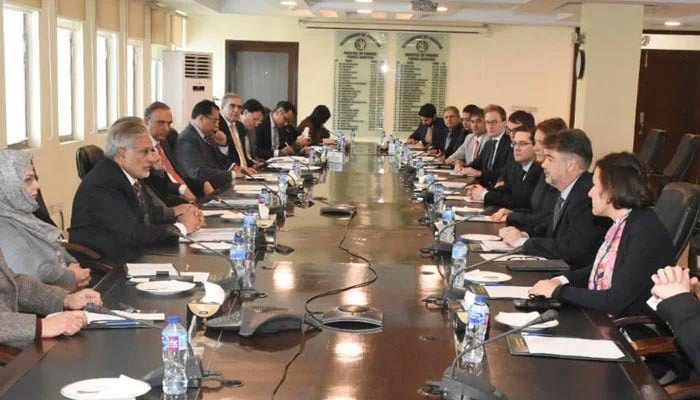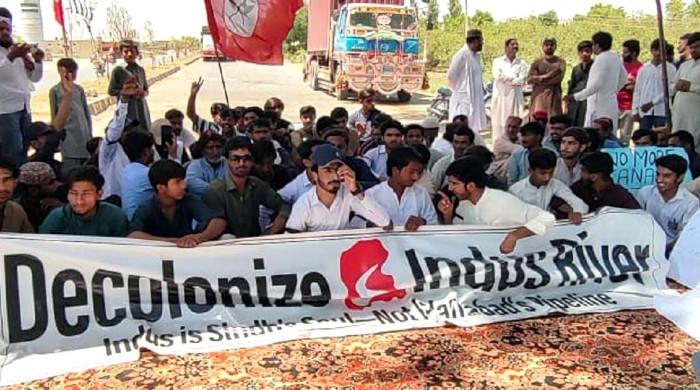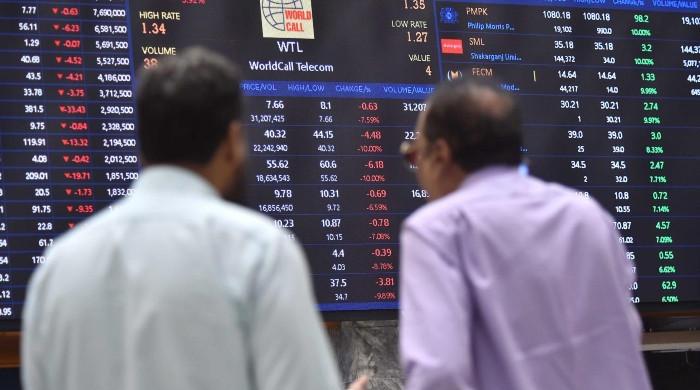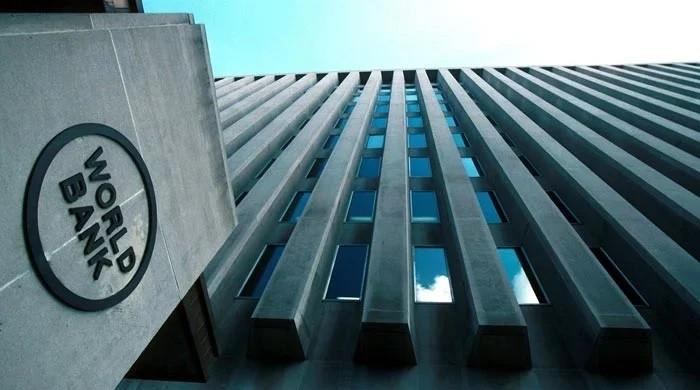First round of ‘tough’ Pakistan-IMF talks concludes
IMF will share nine tables comprising macroeconomic and fiscal framework with Pakistan on Monday under draft of MEFP
February 04, 2023

- If Pakistan, IMF reach consensus by Feb 9, they will sign staff-level agreement.
- Increase in FBR's tax collection target on the cards.
- IMF asks for slapping additional taxes on qualitative, substantial and sustainable basis.
ISLAMABAD: The International Monetary Fund (IMF) is supposed to share nine tables comprising macroeconomic and fiscal framework with Pakistan, paving way for policy-level talks next week as both parties have concluded the first round of technical talks on Friday, The News reported Saturday.
If Pakistan and the Washington-based lender reach a consensus on prescriptions to fix the economy by February 9, then the two will sign a staff-level agreement.
The ongoing negotiations between the two sides, which started on January 31, have been termed as "tough" by Prime Minister Shehbaz Sharif.
The premier, while speaking at a meeting in Peshawar on Friday, said that the IMF is giving "a tough time" to Finance Minister Ishaq Dar and his team, hinting at harsh measures to be taken to revive the stalled loan programme.
The authorities have massively revised downward the macroeconomic framework and shared it with the Fund under which the real GDP growth is projected to slash from 5% to 1.5% to 2% while inflation is going to escalate from 12.5% to 29% on average in the current fiscal year.
Tax collection target
The visiting IMF team has pointed out that the nominal growth (real GDP growth rate plus CPI-based inflation) is projected to cross the 30% mark so the Federal Board of Revenue of Pakistan's (FBR) tax-to-GDP ratio is bound to decline even if it achieves the envisaged annual tax collection target of Rs7,470 billion.
An increase in the FBR’s tax collection target is on the cards but its exact level of additional taxation will be determined after receiving the nine tables worked out by the IMF mission which will be shared with the Pakistani authorities on Monday under the draft of Memorandum of Financial and Economic Policies (MEFP).
“The IMF’s prescription suggests the hardest choices on taxation and non-taxation fronts in order to fill the yawning fiscal gap. Different proposals are under consideration including jacking up petroleum levy by Rs20-30 per litre by maximising the limit from the existing level of Rs50 per litre to Rs70-80 per litre or slapping 17% GST on POL products or increasing the GST rate by 1% from 17 to 18% through a presidential ordinance,” sources confirmed while talking to The News.
All those who know Finance Minister Ishaq Dar believed that he would try to resist the raising of the GST rate. His first priority will be to convince the IMF to enhance the petroleum levy because its collection will remain within the kitty of the federal government. If the IMF does not agree, then the second priority will be choosing a reduced GST rate on POL products and the third option will be allowing the imposition of 17% GST on POL products. His last choice will be allowing the imposition of an enhanced GST rate by 1% from 17 to 18% because it will be highly inflationary amid persistent stagflation.
Mini-budget
On other hand, the IMF has asked for slapping additional taxes on a qualitative, substantial and sustainable basis that should be done in an irreversible way.
The FBR has prepared proposals to jack up the Federal Excise Duty (FED) on cigarettes from Rs6,500 per 1,000 cigarettes. It indicates that the government will increase the FED rate to Rs0.50 per stick so the packet rate will go up by Rs10.
There is another proposal of raising the FED rate on sugary beverages up to 17% from the existing rate of 13% through the mini-budget.
However, the FBR has been facing immense pressure from the diplomatic corps in this regard. Another aspect is that sugar is being used in these beverages so the sweetener owners who enjoy political connections irrespective of the political divide will also make last-ditch efforts to block this proposal at any stage.
Measures like the flood levy of 1% to 3%, bringing lofty profits earned by banks through the levy and raising rates of withholding rates are also are on cards.
Now Prime Minister Shehbaz Sharif and Dar will have to make the toughest choices at the cost of political capital at a time when the mainstream political party Pakistan Tehreek-e-Insaf (PTI) has refused to attend the all parties conference called by the premier on coming Tuesday.
Declaration of assets
Meanwhile, the FBR has notified Sharing of Declaration of Assets of Civil Servants Rules, 2023 under which information about the assets of civil servants from grades BS-17 to BS-22 would be shared between the FBR and the banks.
According to Statutory Regulatory Order (S.R.O) 80(I)/2023 issued by the FBR, the board shall share a simplified or abridged version of the declaration, based on the fields agreed with the State Bank of Pakistan, made by a civil servant in his electronic declaration filed with FBR, reports the local media.
The bank shall use a pre-notified, secured and single authorised email address and the email account shall be under the control and responsibility of the head of compliance of the bank in terms of its authorisation, use and security of data being shared.
The authorised email account shall be used for request or receipt of simplified declarations as envisaged under sub-rule (3) of the rule. The bank shall communicate to the FBR the credentials of a maximum of four Focal Persons (officials) authorised to communicate with the FBR through the authorised email.
The following information shall be furnished by the bank in respect of focal persons.
The bank shall promptly communicate any change of Focal Persons’ credentials above and shall not allow using the secured email until the credentials have been communicated to the FBR.
The FBR shall provide simplified or abridged information, within five working days through the authorised email, or may refuse in case information is not available or cannot be provided due to any reason.
In case of dispute, the decision of FBR shall prevail being the custodian of information.
The bank shall provide bi-annual feedback on the use of information received by the bank as well as on the outcome of CDD in terms of the success of new accounts opened and how the information helped the bank in establishing its client relationship. Case-wise feedback will be provided by July 31 and January 31 every year of the preceding six months’ information requests made by the bank.












